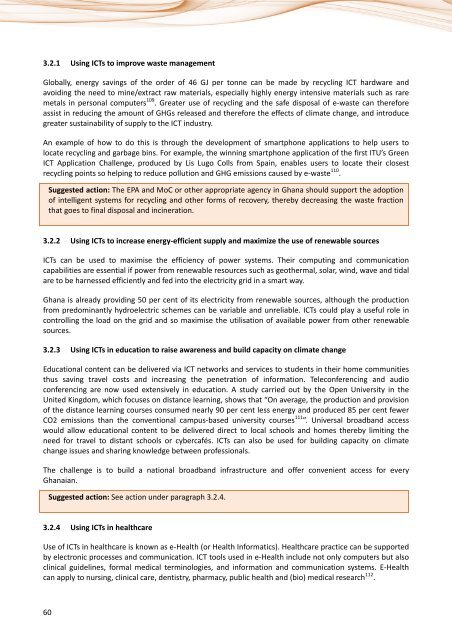Information and communication technologies (ICTs) and ... - ITU
Information and communication technologies (ICTs) and ... - ITU
Information and communication technologies (ICTs) and ... - ITU
Create successful ePaper yourself
Turn your PDF publications into a flip-book with our unique Google optimized e-Paper software.
3.2.1 Using <strong>ICTs</strong> to improve waste management<br />
Globally, energy savings of the order of 46 GJ per tonne can be made by recycling ICT hardware <strong>and</strong><br />
avoiding the need to mine/extract raw materials, especially highly energy intensive materials such as rare<br />
metals in personal computers 109 . Greater use of recycling <strong>and</strong> the safe disposal of e-waste can therefore<br />
assist in reducing the amount of GHGs released <strong>and</strong> therefore the effects of climate change, <strong>and</strong> introduce<br />
greater sustainability of supply to the ICT industry.<br />
An example of how to do this is through the development of smartphone applications to help users to<br />
locate recycling <strong>and</strong> garbage bins. For example, the winning smartphone application of the first <strong>ITU</strong>’s Green<br />
ICT Application Challenge, produced by Lis Lugo Colls from Spain, enables users to locate their closest<br />
recycling points so helping to reduce pollution <strong>and</strong> GHG emissions caused by e-waste 110 .<br />
Suggested action: The EPA <strong>and</strong> MoC or other appropriate agency in Ghana should support the adoption<br />
of intelligent systems for recycling <strong>and</strong> other forms of recovery, thereby decreasing the waste fraction<br />
that goes to final disposal <strong>and</strong> incineration.<br />
3.2.2 Using <strong>ICTs</strong> to increase energy-efficient supply <strong>and</strong> maximize the use of renewable sources<br />
<strong>ICTs</strong> can be used to maximise the efficiency of power systems. Their computing <strong>and</strong> <strong>communication</strong><br />
capabilities are essential if power from renewable resources such as geothermal, solar, wind, wave <strong>and</strong> tidal<br />
are to be harnessed efficiently <strong>and</strong> fed into the electricity grid in a smart way.<br />
Ghana is already providing 50 per cent of its electricity from renewable sources, although the production<br />
from predominantly hydroelectric schemes can be variable <strong>and</strong> unreliable. <strong>ICTs</strong> could play a useful role in<br />
controlling the load on the grid <strong>and</strong> so maximise the utilisation of available power from other renewable<br />
sources.<br />
3.2.3 Using <strong>ICTs</strong> in education to raise awareness <strong>and</strong> build capacity on climate change<br />
Educational content can be delivered via ICT networks <strong>and</strong> services to students in their home communities<br />
thus saving travel costs <strong>and</strong> increasing the penetration of information. Teleconferencing <strong>and</strong> audio<br />
conferencing are now used extensively in education. A study carried out by the Open University in the<br />
United Kingdom, which focuses on distance learning, shows that “On average, the production <strong>and</strong> provision<br />
of the distance learning courses consumed nearly 90 per cent less energy <strong>and</strong> produced 85 per cent fewer<br />
CO2 emissions than the conventional campus-based university courses 111 ”. Universal broadb<strong>and</strong> access<br />
would allow educational content to be delivered direct to local schools <strong>and</strong> homes thereby limiting the<br />
need for travel to distant schools or cybercafés. <strong>ICTs</strong> can also be used for building capacity on climate<br />
change issues <strong>and</strong> sharing knowledge between professionals.<br />
The challenge is to build a national broadb<strong>and</strong> infrastructure <strong>and</strong> offer convenient access for every<br />
Ghanaian.<br />
Suggested action: See action under paragraph 3.2.4.<br />
3.2.4 Using <strong>ICTs</strong> in healthcare<br />
Use of <strong>ICTs</strong> in healthcare is known as e-Health (or Health Informatics). Healthcare practice can be supported<br />
by electronic processes <strong>and</strong> <strong>communication</strong>. ICT tools used in e-Health include not only computers but also<br />
clinical guidelines, formal medical terminologies, <strong>and</strong> information <strong>and</strong> <strong>communication</strong> systems. E-Health<br />
can apply to nursing, clinical care, dentistry, pharmacy, public health <strong>and</strong> (bio) medical research 112 .<br />
60

















